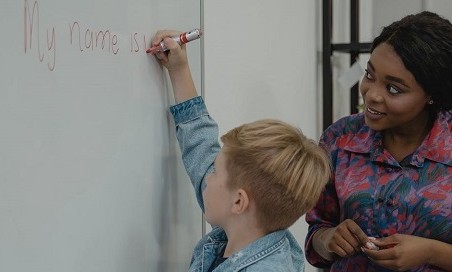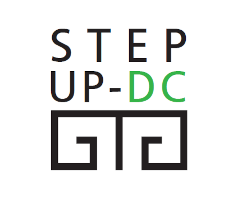Session 7C, ENGLISH LANGUAGE - 2 - Developing intercultural competence with Young Learners of English
STEPUP-DC Project

Course DescriptionBasic Topics
- Understanding intercultural communicative competence
- Developing intercultural awareness
- Dealing with diversity and overcoming stereotypes
Objectives
The Objective of this session is:
- Train future teachers to be able to promote the development of competences for democratic culture and intercultural dialogue through their (future) daily work with children and young people in schools
Learning outcomes
On the completion of the session, students will be able to:
- Define intercultural communicative competence and intercultural learning in the context of young learners
- Define intercultural activities for students
- Name the characteristics of intercultural activities
- Design topic-based lessons for the development of intercultural communicative competence in the young learners’ classroom
- Exploit stories for raising young learners’ intercultural awareness
Outcomes and CDC
- Knowledge and critical understanding
- 108: Can reflect critically on his/her own values and beliefs (intermediate)
- 109: Can reflect critically on himself/herself from a number of different perspectives (intermediate)
- 120: Can reflect critically on how her/his own world view is just one of many world views (basic)
- Values
- Valuing cultural diversity
- 203: Argues that one should promote communication and dialogue between people from different cultural backgrounds (basic/intermediate)
- 204: Expresses the view that the cultural diversity within a society should be positively valued and appreciated (intermediate)
- Attitudes
- Open to Cultural Otherness
- 401: Shows interest in learning about people’s beliefs, values, traditions and world views (basic)
- 402: Expresses interest in travelling to other countries (basic)
- Respect
- 502: Expresses respect for other people as equal human beings (basic)
- Civic mindedness
- 601: Expresses a willingness to co-operate and work with others (basic)
- Skills
- Autonomous Learning Skills
- 1001: Shows ability to identify resources for learning (e.g. people, books, internet) (basic)
- 1003: Accomplishes learning tasks independently (basic)
- 1006: Can identify relevant sources of information to accomplish a learning task (basic/intermediate)
- 1007: Can gather information effectively using a variety of techniques and sources (basic/intermediate)
- Understanding intercultural communicative competence
- Developing intercultural awareness
- Dealing with diversity and overcoming stereotypes
The Objective of this session is:
- Train future teachers to be able to promote the development of competences for democratic culture and intercultural dialogue through their (future) daily work with children and young people in schools
On the completion of the session, students will be able to:
- Define intercultural communicative competence and intercultural learning in the context of young learners
- Define intercultural activities for students
- Name the characteristics of intercultural activities
- Design topic-based lessons for the development of intercultural communicative competence in the young learners’ classroom
- Exploit stories for raising young learners’ intercultural awareness
- Knowledge and critical understanding
- 108: Can reflect critically on his/her own values and beliefs (intermediate)
- 109: Can reflect critically on himself/herself from a number of different perspectives (intermediate)
- 120: Can reflect critically on how her/his own world view is just one of many world views (basic)
- Values
- Valuing cultural diversity
- 203: Argues that one should promote communication and dialogue between people from different cultural backgrounds (basic/intermediate)
- 204: Expresses the view that the cultural diversity within a society should be positively valued and appreciated (intermediate)
- Valuing cultural diversity
- Attitudes
- Open to Cultural Otherness
- 401: Shows interest in learning about people’s beliefs, values, traditions and world views (basic)
- 402: Expresses interest in travelling to other countries (basic)
- Respect
- 502: Expresses respect for other people as equal human beings (basic)
- Civic mindedness
- 601: Expresses a willingness to co-operate and work with others (basic)
- Open to Cultural Otherness
- Skills
- Autonomous Learning Skills
- 1001: Shows ability to identify resources for learning (e.g. people, books, internet) (basic)
- 1003: Accomplishes learning tasks independently (basic)
- 1006: Can identify relevant sources of information to accomplish a learning task (basic/intermediate)
- 1007: Can gather information effectively using a variety of techniques and sources (basic/intermediate)
- Autonomous Learning Skills
A series of resources that the student teacher must study in this session and a series of additional resources for further study.
A full paper and additional e-lessons on the topics of the session and additional interactive presentation of the materials, for the student teachers to study all the materials in a row.
A series of authentic, up to date and relevant activities with their accompanying materials, which deliver the intended learning outcomes of the session and are carried out face to face or E-learning with groups of student teachers.
Several types of questions to evaluate how much the student teachers have learned throughout the session (reading material, learning material and workshop).
